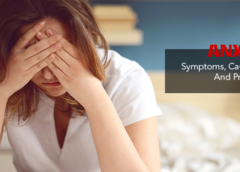Experiencing occasional anxiety disorders is a normal part of life. However, people with anxiety disorders frequently have intense, excessive, and persistent worry and fear about everyday situations. Often, anxiety disorders involve repeated episodes of sudden feelings of extreme anxiety and fear or terror hitting a peak in a matter of minutes (panic attacks).
What are Anxiety Disorders
Such feelings of fear and panic interfere with day-to-day tasks, are difficult to manage, are out of proportion to the actual danger, and can last for long. To prevent those feelings, you can avoid places or situations. Symptoms can begin during childhood or adolescence and continue into adulthood.
Examples of anxiety disorders include common anxiety disorder, social anxiety disorder, particular phobias, and isolation anxiety disorder. You may have many anxiety disorders. Anxiety often results from a medical condition that needs treatment. Whatever type of anxiety you have, therapy can help.
Symptoms of Anxiety Disorders
Typical signs and symptoms of anxiety include:
- Feeling anxious, agitated, or stressed
- Having a sense of imminent threat, fear, doom
- Elevated heart rate
- Fast breathing
- Sweating
- Trembling
- Feeling weak or exhausted
- Concentrating on trouble or worrying about something rather than the present worry
- Sleeping difficulty
- Gastrointestinal problems
- Having trouble controlling worries
- Having the urge to avoid anxiety-cause things
When to see a doctor
Visit your doctor if you see the symptoms of anxiety disorders:
- You feel like you are worrying too much and it’s interfering with your work, relationships, or other parts of your life
- Your fear, worry, or anxiety is upsetting to you and difficult to control
- You feel depressed, have an alcohol or drug use problem, or have another mental health issue along with anxiety
- You think your anxiety might be related to a physical health issue
- If you have suicidal thoughts or symptoms, seek urgent treatment immediately
Your problem may not go away on their own if you do not seek help and your problem may get worse over time. Before your anxiety gets worse see your doctor or a mental health provider. If you get treatment early it is easier to handle.
Causes
The origins of anxiety disorders are not completely comprehended. Life conditions like stressful events appear to trigger anxiety disorders in people who are already prone to anxiety. Hereditary characteristics may also be a factor.
Medical causes
Anxiety may be related to underlying health conditions for certain people. In certain cases, anxiety signs and symptoms are the first indicators of a medical illness. If your doctor believes there may be a medical reason for your anxiety, the doctor may order tests to check for symptoms of a problem.
Examples of medical conditions that may be linked to anxiety disorders include:
- Heart disease
- Diabetes
- Thyroid issues, like hyperthyroidism
- Respiratory disorders, such as chronic obstructive pulmonary disease (COPD) and asthma
- Drug misuse or withdrawal
- Withdrawal from alcohol, anti-anxiety medication, or other medicines
- Chronic pain or irritable bowel syndrome
- Rare tumors that produce certain fight-or-flight hormones
Anxiety can also be a side effect of certain medications.
- The anxiety could be attributable to an underlying medical condition if:
- You don’t have any blood relatives (such as a parent or sibling) with an anxiety disorder
- You didn’t have an anxiety disorder as a child
- You don’t avoid certain things or situations because of anxiety
- You have a sudden occurrence of anxiety that seems unrelated to life events and you didn’t have a previous history of anxiety
Risk factors
These factors can increase your chance of developing an anxiety disorder:
- Trauma: Children who have suffered abuse or trauma or witnessed traumatic events are at some point in life at a higher risk of developing an anxiety disorder. Adults who experience a traumatic event also can develop anxiety disorders.
- Stress due to an illness: Having a health problem or severe illness can cause considerable concern about issues like your treatment and your future.
- Stress buildup: A big event or a combination of smaller stressful life circumstances may cause unnecessary anxiety-like, family death, job work stress, or ongoing financial concern.
- Personality: People with some types of personality are more susceptible than others to anxiety disorders.
- Other mental health disorders: Those with other mental health problems, such as depression, can frequently have an anxiety disorder.
- Having blood relatives suffering from an anxiety disorder:Â Disorders of anxiety can occur in families.
- Drugs or alcohol: The use or misuse or withdrawal of drugs or alcohol can cause or exacerbate anxiety.
Complications
This does more than make you think about developing an anxiety disorder. It may also lead to, or exacerbate, other mental and physical issues, such as:
- Depression (which often occurs with an anxiety disorder) or other mental health disorders
- Substance misuse
- Sleep disruption (insomnia)
- Digestive or bowel problems
- Headaches and constant pain
- Social isolation
- Problems functioning at school or work
- Bad quality of life
- Suicide
Prevention for Anxiety
There is no way to predict for sure what will cause someone to develop an anxiety disorder, but if you are anxious you can take steps to minimize the impact of signs:
- Get help early:Â Like many other mental health issues, anxiety can be harder to treat if you wait.
- Stay active: Participate in things you enjoy and feel good about yourself. Enjoy social contact and loving relationships that can reduce your worries.
- Don’t use drugs or alcohol: The use of alcohol and drugs use can cause anxiety. If you are addicted to any of those substances, you may be anxious about quitting. If you are unable to quit yourself, see your doctor or find a support group to help you.

Leave a Reply
You must be logged in to post a comment.